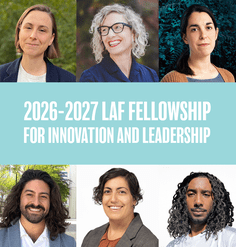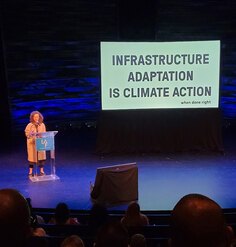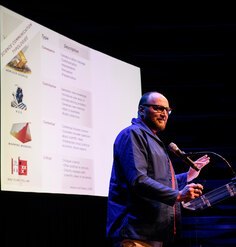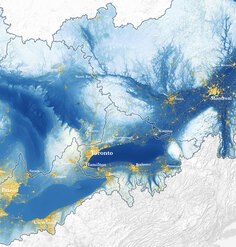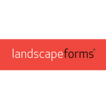LAF Fellows Look Forward to a Year Exploring Big Ideas
The 2019-2020 cohort of the LAF Fellowship for Innovation and Leadership kicked off their yearlong journey this month, June 2019, with their first residency in Washington, DC. There, they began to explore the 'why' behind their projects and form the relationships and intergenerational mentorship they will carry with them through the year and into the future. As they immerse themselves in the fellowship, LAF caught up with each fellow, asking what they are hoping to take away from the program, as well as questions about their projects and the leaders who inspire them which will be published later this summer. Here are their responses when asked, "What is something you are hoping to take away from your fellowship experience?"
Diana Fernandez: I am hoping to be able to deepen my research by leveraging the cohort's collective experience to inform my thinking and influence my research outcomes. I think the yearlong experience will produce research that will help advance our profession and create new paradigms for design excellence.
Hans Baumann: As a solo practitioner, I am looking forward to the opportunity to develop my project with the support of the other Fellows and with the Landscape Architecture Foundation, in general. The program is set up to provide each Fellow with feedback throughout the development of the project, but it also requires us to present the project in multiple ways, often forcing us to distill incredibly complex issues into something concise and easily understood. These are rare opportunities outside of an academic environment and I am hoping to take away a richer and more expansive understanding of my own Fellowship project from this process, as well as potential outcomes or next steps for future collaboration between landscape architects and indigenous communities [the subject of my project].
Jeff Hou: [I am looking forward to] the opportunity to involve a group of peer scholars and practitioners in further developing ways to integrate design activism into design education.
Pierre Bélanger: Building an unshakable transgenerational coalition, through connections across past and current scholars and Fellows, that contributes to deep territorial, and political understanding of the field of landscape; tremendous is its power to shape institutional change on the ground related to environmental justice and spatial inequality.
Together with the cohort of Fellows and Scholars, I’d like us to work together towards advocating for and creating a protocol for territorial acknowledgment of Indigenous lands in Washington DC. In collaboration with Indigenous Peoples of Piscataway and Patawomeck Nations in the Potomac River and Chesapeake Bay region, there is an everlasting precedent that the Landscape Architecture Foundation can establish this coming year and set a precedent for other landscape architecture organizations, practitioners, and institutions. If land is the foundation of our work, then acknowledging and active engagement the histories, legacies, and sovereignties of those lands is fundamental. That is transformative, innovative, leading change.
The LAF Olmsted Scholars selected for the fellowship expressed the value of this opportunity for emerging professionals:
Liz Camuti: This fellowship offers what to me is an unprecedented opportunity to tackle difficult questions about our changing roles and responsibilities as landscape architects among a cohort of experienced and diverse practitioners. As someone with relatively little professional experience, I hope to learn from my cohort how the profession has evolved and is continuing to evolve in terms in terms of the way we engage with marginalized communities in particular.
Nick Jabs: As a young professional, this fellowship is an opportunity to elevate and forefront the issues that brought me to the discipline. The Fellowship and the Foundation, through the advancement of my research and the mentorship of its leaders, will unlock new levels of agency for myself, and hopefully the profession at large, to address the increasingly urgent environmental, social, economic and political aspects of our built environment.
